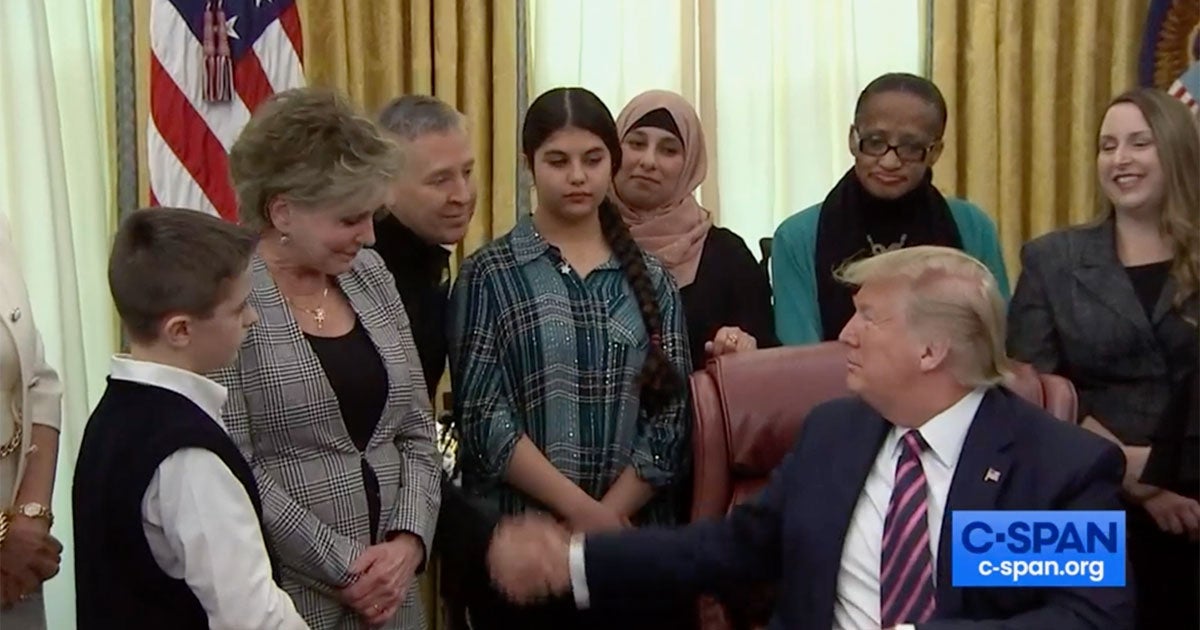
Last week, on Religious Freedom Day, First Liberty celebrated a major victory for the rights of students, teachers, coaches and public employees who want to freely live out their faith in school.
Our President and Chief Counsel, Kelly Shackelford, along with First Liberty clients Hannah Allen and Coach Joe Kennedy, joined President Trump in the Oval Office to participate in the announcement of several actions by the administration to protect religious freedom for all Americans.
In this exclusive video, watch as Hannah and Coach Kennedy share their stories at the White House. Hannah recounts how First Liberty successfully defended her constitutional right to pray with friends during lunch hour after she was ordered to stop and “go behind a curtain” by school officials. It’s worth mentioning that Hannah can be seen wearing an inspirational replica dog tag provided by our clients, Shields of Strength.
Coach Kennedy also tells about his ongoing legal battle after he was fired by school district bureaucrats for praying on the field after football games.
Consistent with numerous pro-religious freedom policies implemented throughout the last three years, the White House’s announcement added another unprecedented achievement that will help strengthen religious liberty protections.
Here is a brief breakdown of the three important actions the administration recently took to protect your religious freedom.
Department of Education (DOE) Secretary Betsy DeVos issued updated guidelines on prayer and religious expression in public schools.
The DOE will be notifying states that students should be allowed to freely live out their faith and to exercise their First Amendment right of free speech, and school officials should not censor, interfere or stop student-initiated prayer.
Additionally, the newly revised guidelines include important Supreme Court precedent regarding constitutional exercise of prayer and also clarify the process for people of faith to report violations of their right to pray. It’s particularly noteworthy that the policy updates aren’t just limited to protecting prayer, but also extend to religious expression more broadly, including use of religious literature, teaching about religion, student dress codes, and excusals from schools due to religious reasons.
The White House announced that nine federal agencies (including the Departments of Education (DOE), Health and Human Services (DHHS), Justice (DOJ), Homeland Security (DHS) and Agriculture (USDA)) are proposing rules to ensure compliance with the Faith and Opportunity Initiative established by a 2018 Executive Order.
This policy action will help ensure that religious organizations and their secular counterparts are treated equally by the federal government. Specifically, the rules address burdensome regulations from the prior administration that put religious organizations on a second tier to nonreligious ones.
One important note is that public colleges and universities cannot deny rights, benefits or privileges to a faith-based student organization or discriminate against the leadership of a religious student group.
What’s more, when applying for federal grants, for example, religious organizations will have to comply with the same requirements as secular agencies, giving both the ability to compete on an equal footing for funds.
Acting Director of the Office of Management and Budget (OMB), Russell Vought, issued new guidance requiring that federal and state grant making processes are compliant with the First Amendment.
The OMB’s directive applies to all federal agencies to ensure that the administration of grants is consistent with the U.S. Supreme Court’s precedent set forth in Trinity Lutheran, which states that faith-based organizations cannot be discriminated against because of their religious status.
Updating the regulations governing grants comes at a critical time, especially because this month the Supreme Court heard oral argument on an important case in which religious schools are prohibited from participating in Montana’s school-choice program. The outcome of that case could have a major impact in determining how states regulate access to taxpayer funds.
As we enter into what could be another historic year in reclaiming religious liberty in America, we are thankful to the administration for continuing to make religious freedom a priority. The actions above will help end religious discrimination and ensure people of faith will be treated equally when they seek to partner with federal or state governments to provide services to communities nationwide.
Yet, while we rejoice in this major victory for students, teachers, coaches and school employees, we cannot ignore there’s still an All Out war on faith and religious expression.
Now more than ever, the enemies of religious freedom are aware of the unprecedented progress we’re making in reclaiming our First Freedom. And it’s certain they will move to fight these key actions by the administration.
That’s why at this pivotal moment we cannot become complacent, and must instead capitalize on the incredible opportunities God has presented to us to secure more lasting and precedent-setting victories.
Together, we can build on the momentum and set up a bright future for religious freedom in our nation—for our children and grandchildren.
With your financial support, we can keep winning and reclaiming religious freedom for people of faith in America.
Will you consider donating to First Liberty Institute today?